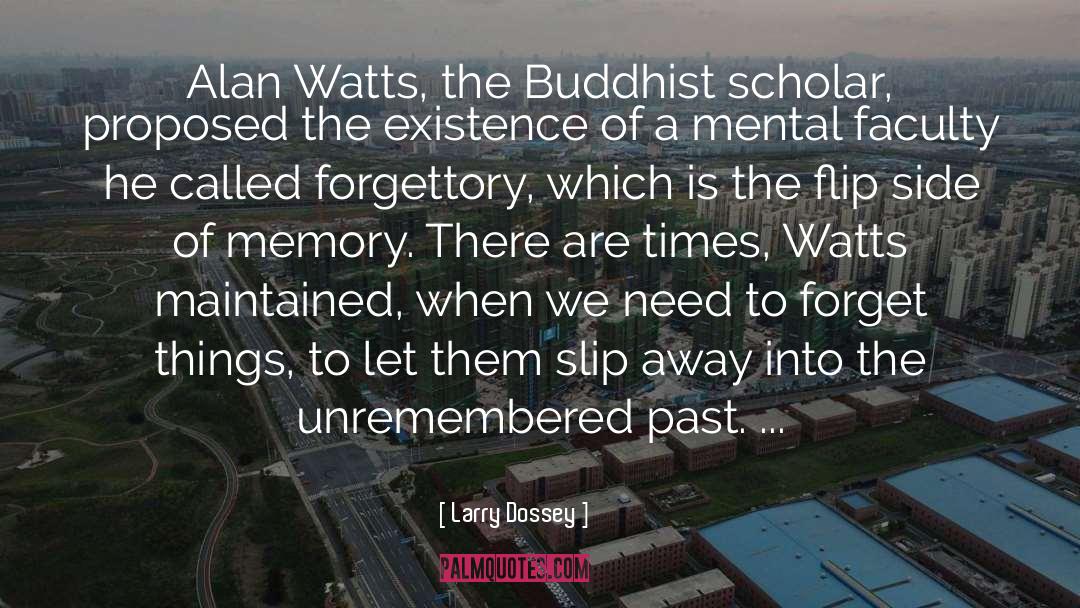Quotes About Buddhist Economics
Enjoy collection of 46 Buddhist Economics quotes. Download and share images of famous quotes about Buddhist Economics. Righ click to see and save pictures of Buddhist Economics quotes that you can use as your wallpaper for free.
Modern economics does not distinguish between renewable and non-renewable materials, as its very method is to equalise and quantify everything by means of a money price. Thus, taking various alternative fuels, like coal, oil, wood, or water-power: the only difference between them recognised by modern economics is relative cost per equivalent unit. The cheapest is automatically the one to be preferred, as to do otherwise would be irrational and "uneconomic." From a Buddhist point of view, of course, this will not do; the essential difference between nonrenewable fuels like coal and oil on the one hand and renewable fuels like wood and water-power on the other cannot be simply overlooked. Non-renewable goods must be used only if they are indispensable, and then only with the greatest care and the most meticulous concern for conservation. To use them heedlessly or extravagantly is an act of violence, and while complete non-violence may not be attainable on this earth, there is nonetheless an ineluctable duty on man to aim at the ideal of non-violence in all he does…
As the world's resources of non-renewable fuels - coal, oil, and natural gas - are exceedingly unevenly distributed over the globe and undoubtedly limited in quantity, it is clear that their exploitation at an ever-increasing rate is an act of violence against nature which must almost inevitably lead to violence between men. ~ Ernst F. Schumacher
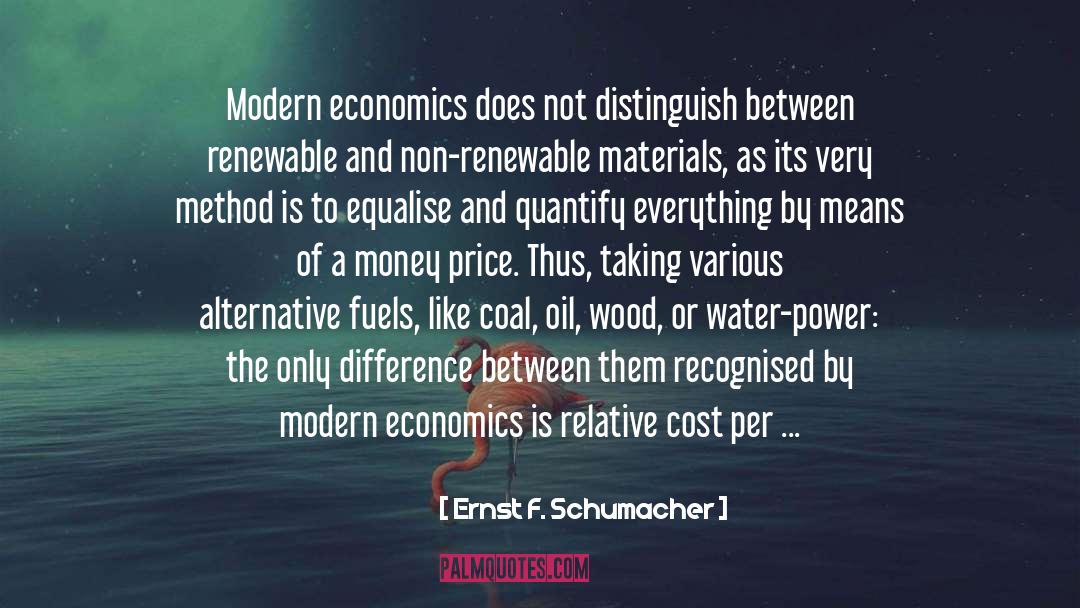
Simplicity and non-violence are obviously closely related. The optimal pattern of consumption, producing a high degree of human satisfaction by means of a relatively low rate of consumption, allows people to live without great pressure and strain and to fulfill the primary injunction of Buddhist teaching: "Cease to do evil; try to do good." As physical resources are everywhere limited, people satisfying their needs by means of a modest use of resources are obviously less likely to be at each other's throats than people depending upon a high rate of use. Equally, people who live in highly self-sufficient local communities are less likely to get involved in large-scale violence than people whose existence depends on world-wide systems of trade. ~ E.F. Schumacher
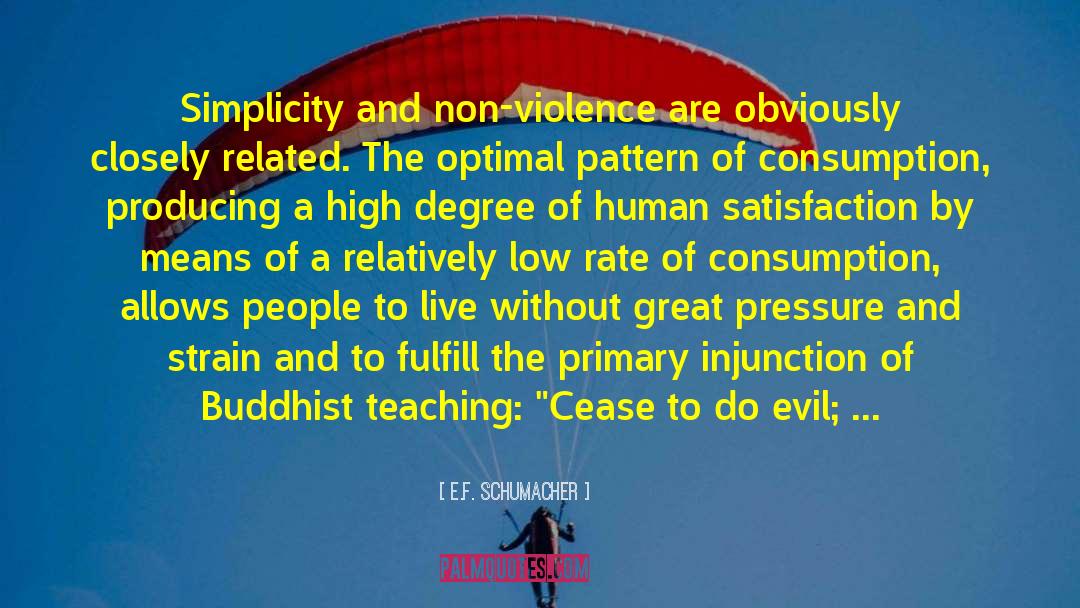
When we recognize that the seemingly object nature of reality is nothing different than the subject nature of mind, which is rigpa, it is called enlightenment. ~ Dzogchen Ponlop Rinpoche

If there were a bunch of Buddhist or Hindus or Roman Catholics carrying out grotesque acts of international terror, I would expect to see their faces on the side of bus. ~ Monica Crowley

When I moved to Beijing in 2005 to write, I was accustomed to hearing the story of China's transformation told in vast, sweeping strokes - involving one fifth of humanity and great pivots of politics and economics. ~ Evan Osnos
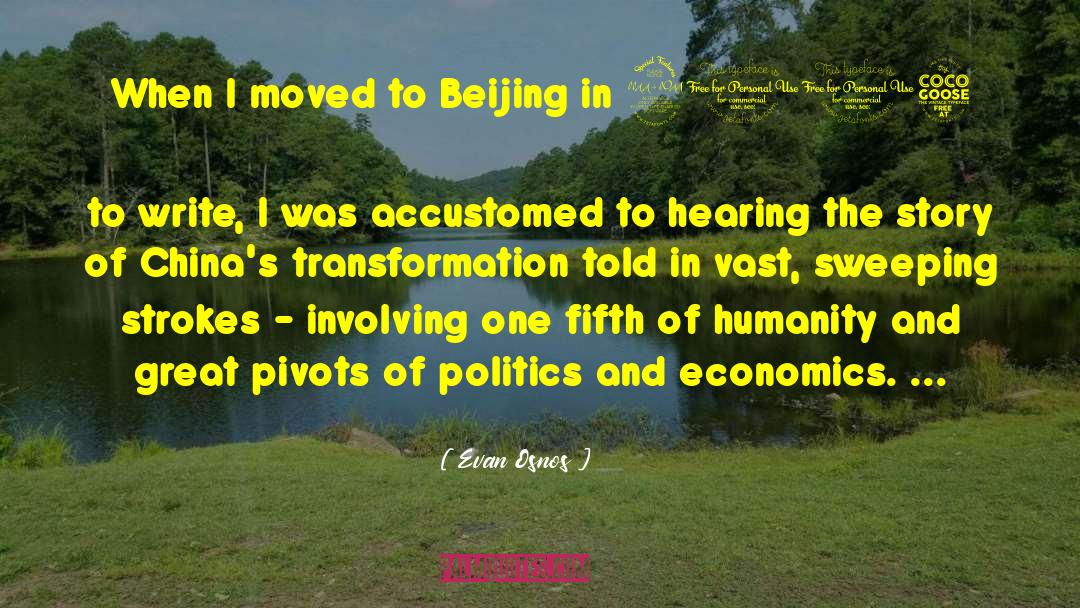
There's many lanes on the highway of enlightenment, they don't have to be on the razor's edge like the yellow line dotted in the middle. Balance is appropriate, not too tight, not too loose, the Middle Way as we call it in Buddhist dharma teachings. ~ Surya Das
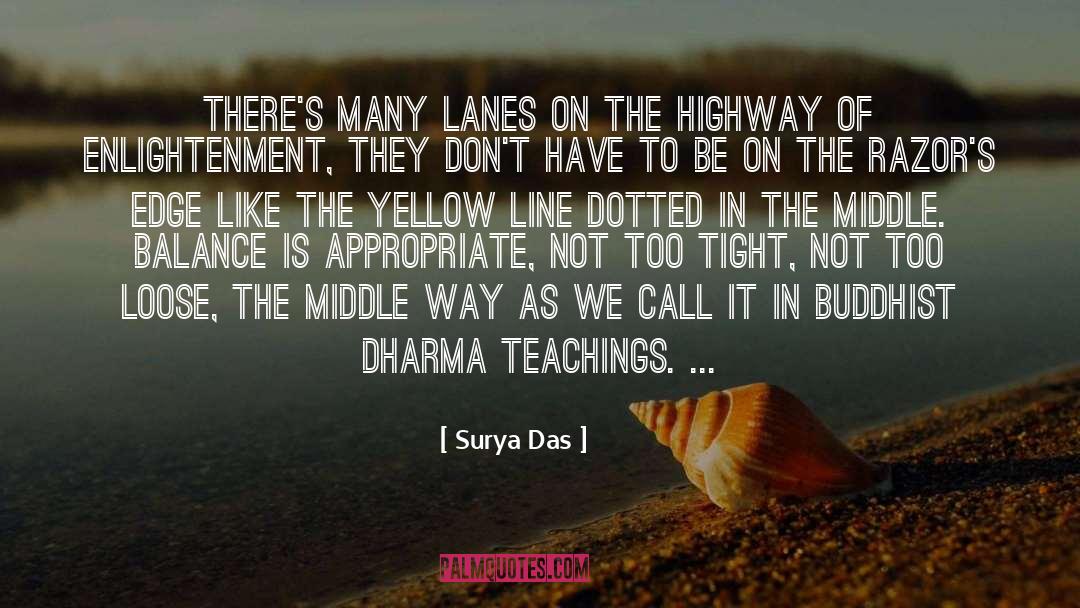
The economy is a wholly owned subsidiary of the environment, not the reverse. ~ Herman E. Daly
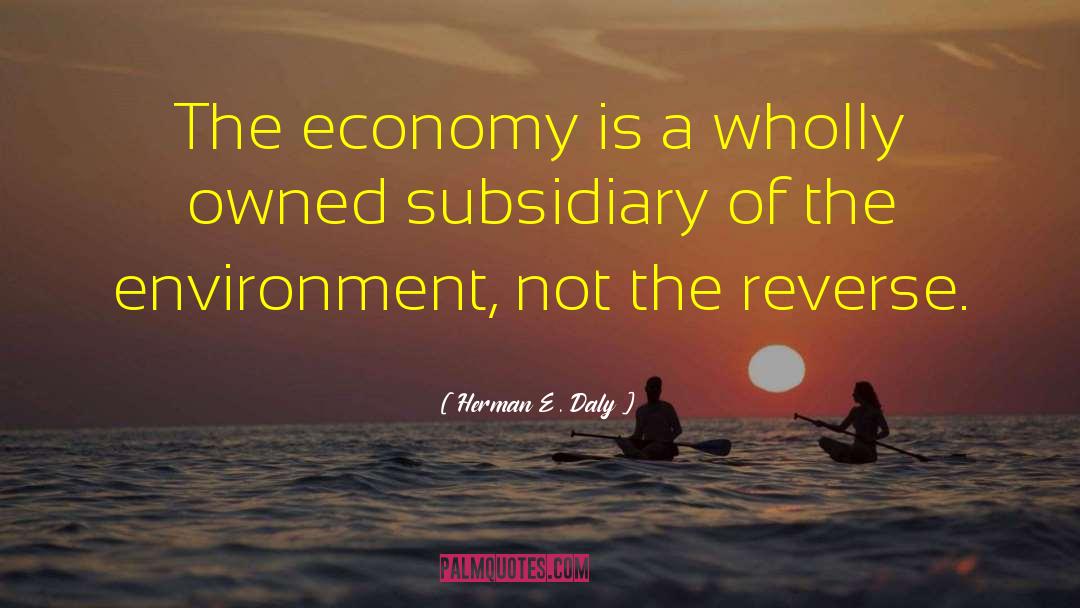
No Buddhist, no Christian, no Hindu. Deeply religious people have no religion. They belong to no seat, theirs is the religion of the heart! ~ Yogaswami
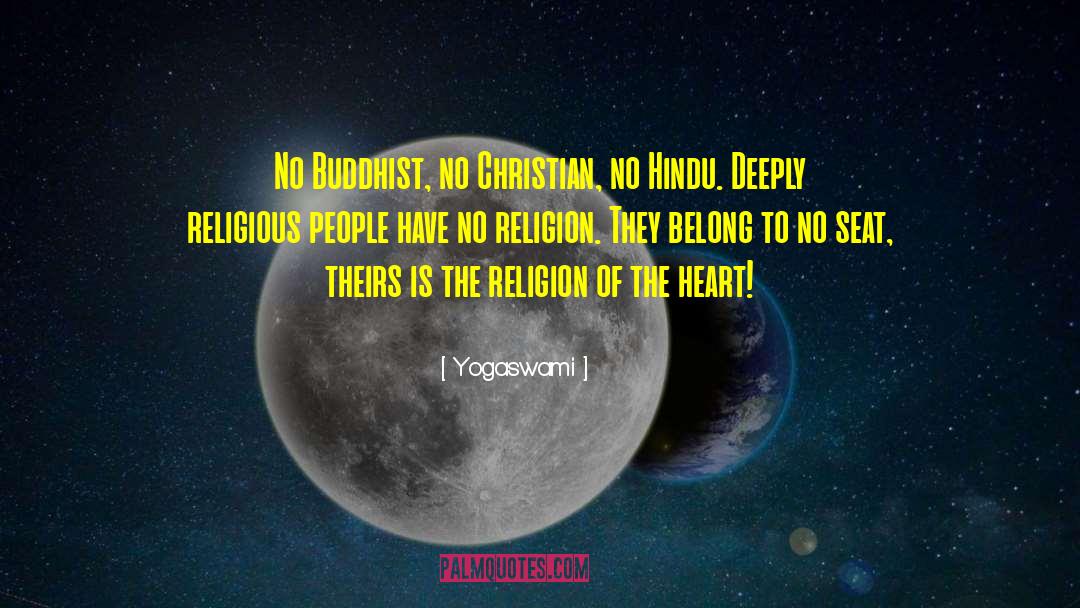
During the last 2,500 years in Buddhist monasteries, a system of seven practices of reconciliation has evolved. Although these techniques were formulated to settle disputes within the circle of monks, i think they might also be of use in our households and in our society.
The first practice is Face-to-Face-Sitting. ~ Thich Nhat Hanh
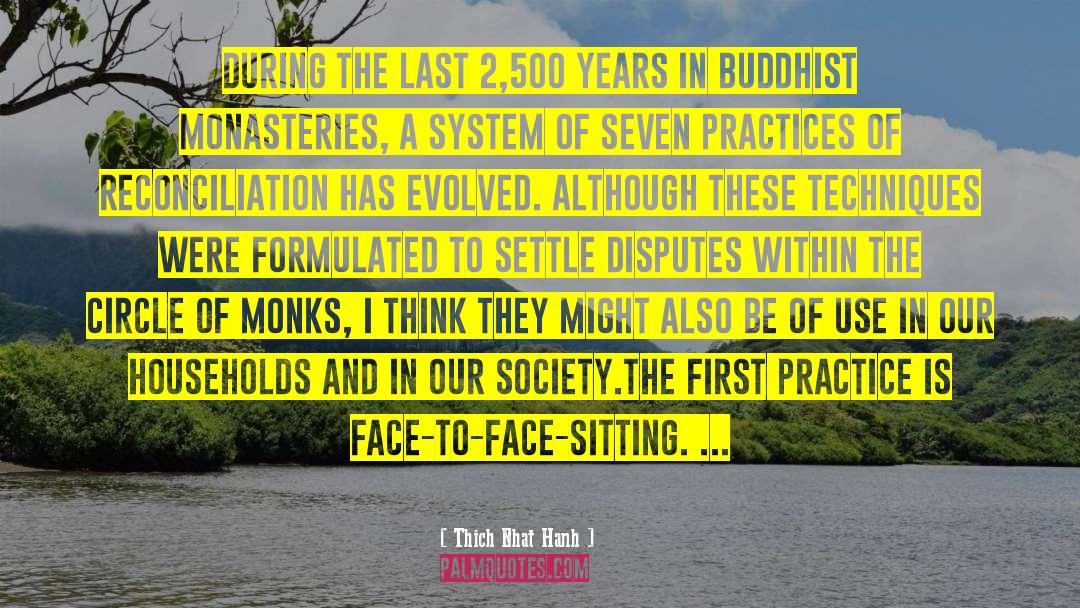
Anybody looking at the history even of the 20th century would not single out Islam as the bloodthirsty religion; it was Christian/Nazi/Communist Europe and Buddhist/Taoist/Hindu/atheist Asia that set records for mass slaughter. ~ Nicholas Kristof

I think anytime that you go to the extreme of any mode of economics, be it capitalism or communism, you have these feedback mechanisms that make the system turn in on itself. ~ Serj Tankian
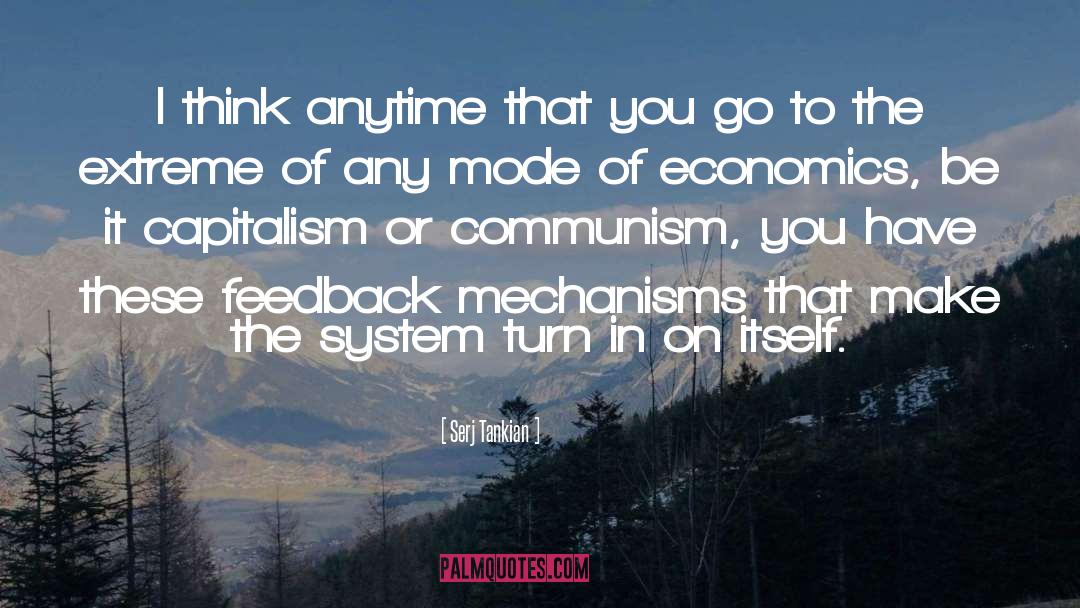
A good way to do econometrics is to look for good natural experiments and use statistical methods that can tidy up the confounding factors that Nature has not controlled for us. ~ Daniel McFadden
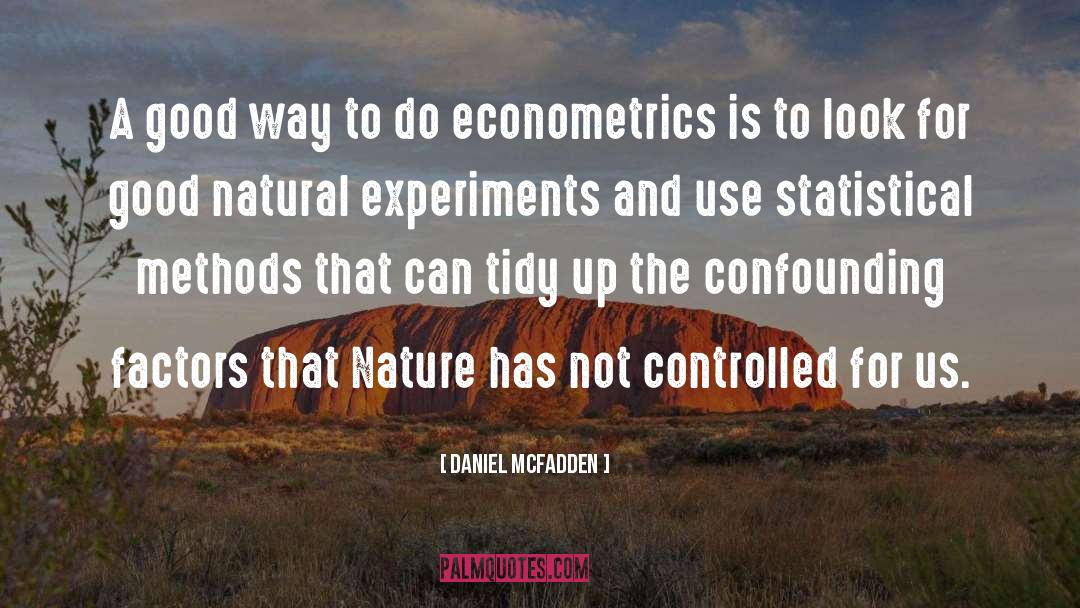
There has to be evil so that good can prove its purity above it. ~ Gautama Buddha
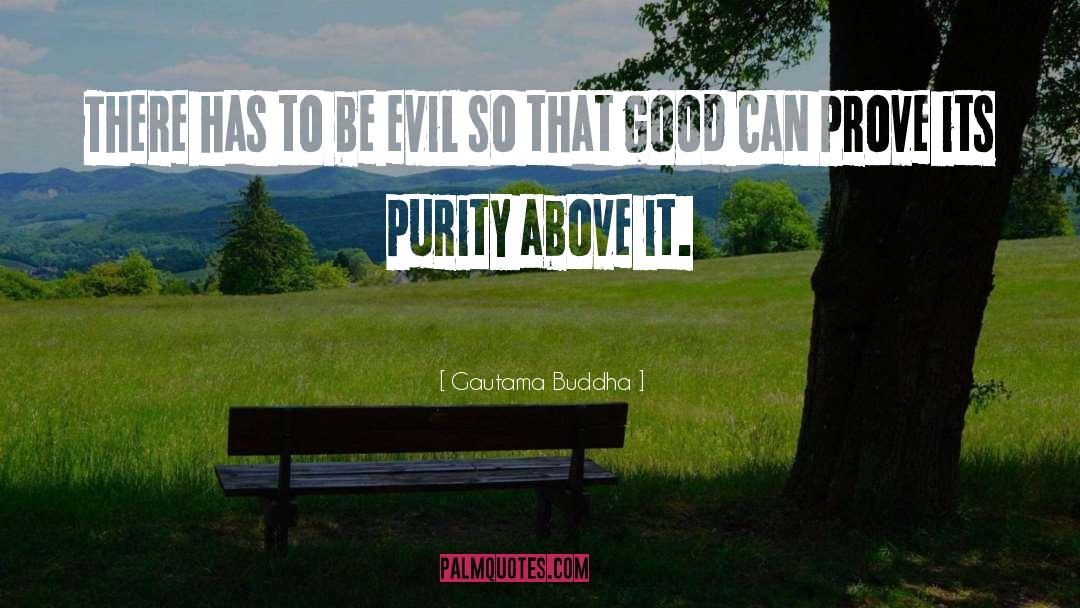
By renouncing samsara, we renounce our habitual grasping, unhappy minds. And by renouncing samsara, we embrace our potential for enlightenment. ~ Thubten Zopa Rinpoche
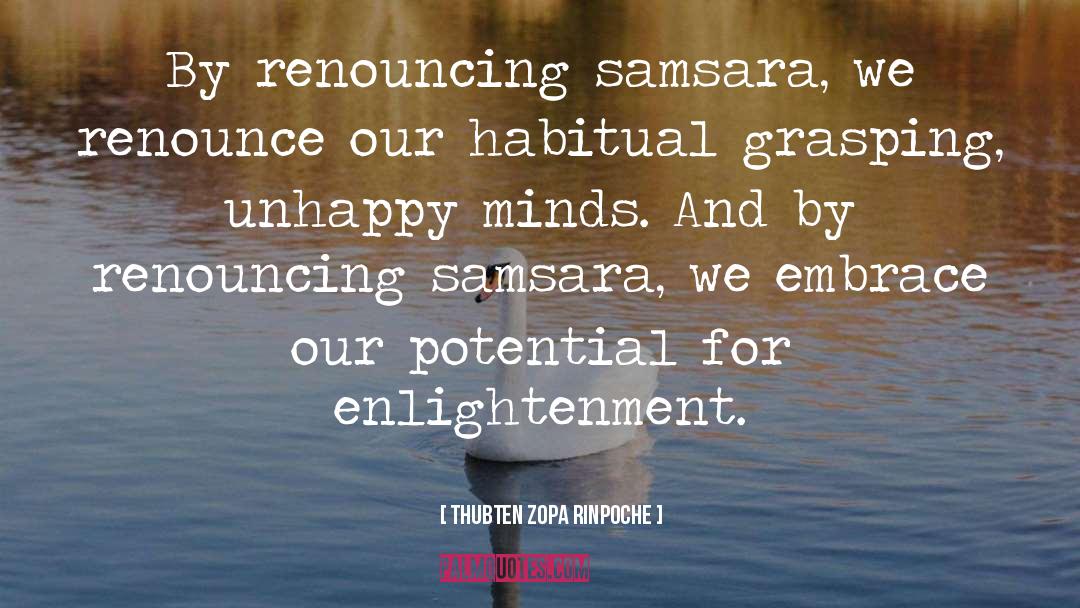
Don't preach about meditation. ~ Frederick Lenz
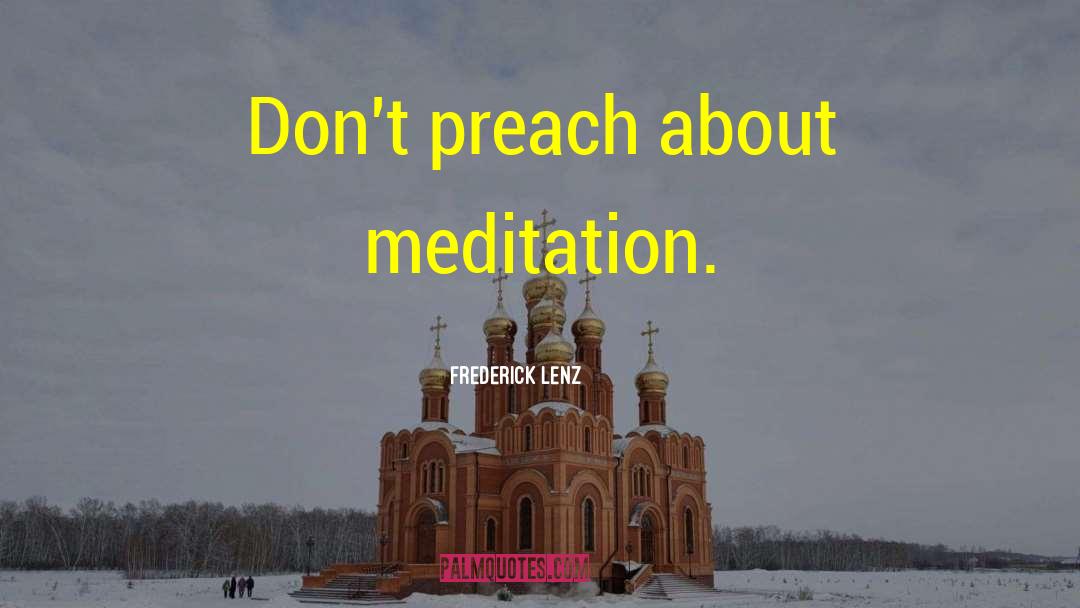
What, then, should you do? With an excellent hand, you should bet: You lose nothing if your opponent folds, while giving yourself a good chance of winning a big pot if he calls. But with a middling hand, you shouldn't bet: If he has a bad hand, he'll fold, and you'll win the ante, which is what you'd have won anyway by checking; but if he has a good hand, he'll call and win. It's heads he wins, tails you don't. You should check instead, and hope your middling hand wins the ante.
What about with a terrible hand? Should you check or bet? The answer is surprising. Checking would be unwise, because the hands will be compared and you will lose. It actually makes more sense to bet with these bad hands, because the only way he might drop out is if you make a bet. Perversely, you are better off betting with awful cards than with mediocre ones, the quintessential (and rational) bluff.
There's a second reason for you to bet with terrible cards rather than middling ones: Your opponent will have to call a little more often. Because he knows that your bets are sometimes very weak, he can't afford to fold too easily. That means that when you bet with a good hand, you are more likely to be called, and to win when you are. Because you are bluffing with bad cards, your good hands make more money. ~ Tim Harford
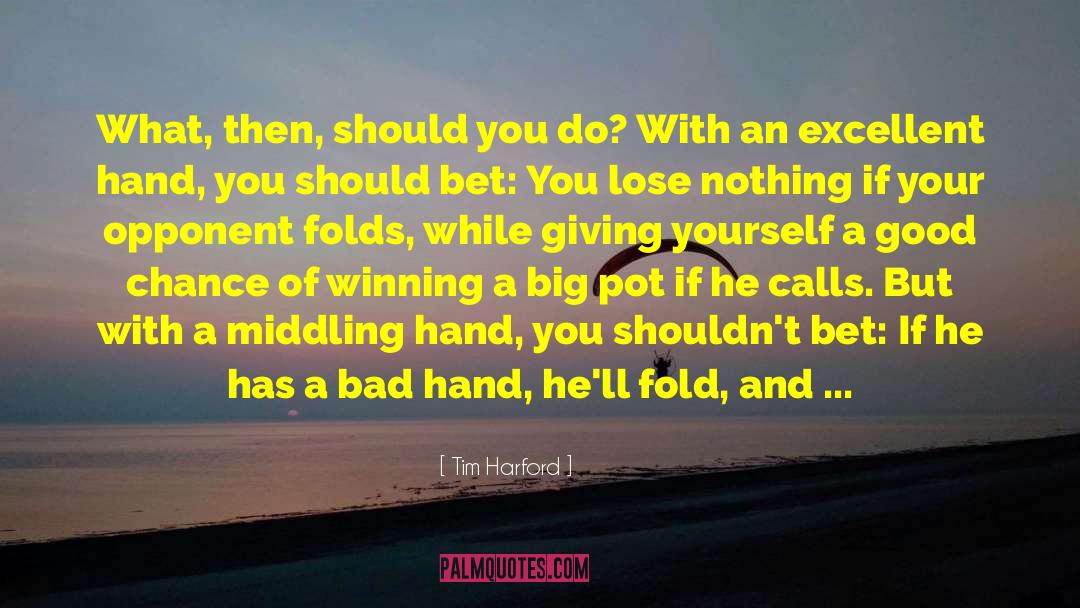
To believe straight away is foolishness, to believe after having seen clearly is good sense. That is the Buddhist policy in belief; not to believe stupidly, or to rely only on people, textbooks, conjecture, reasoning, or whatever the majority believes, but rather to believe what we see clearly for ourselves to be the case. This is how it is in Buddhism. ~ Buddhadasa
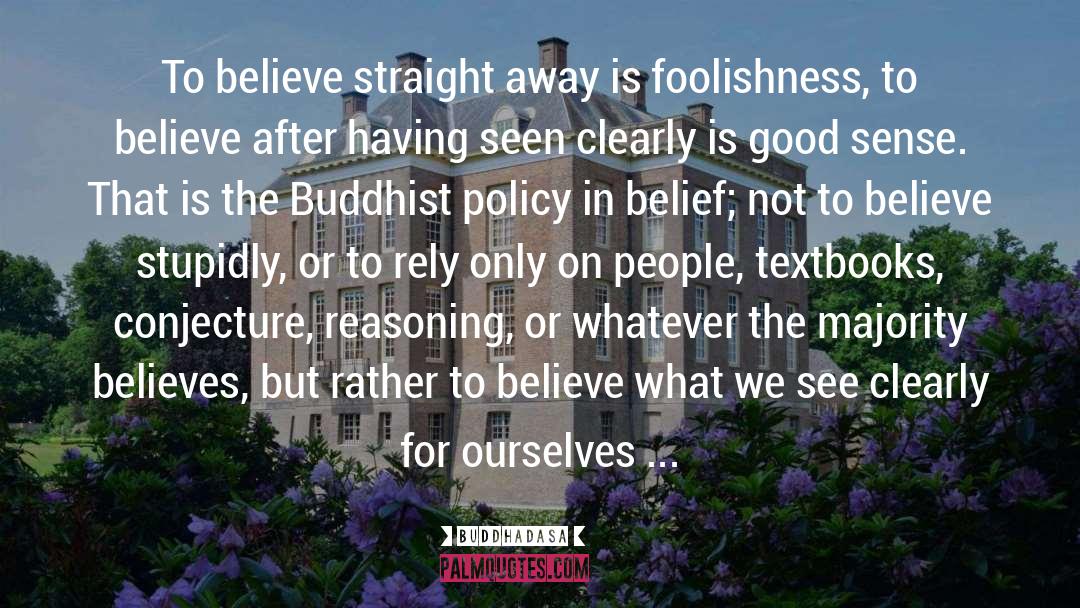
If you are a Buddhist, inspire yourself by thinking of the bodhisattva. If you are a Christian, think of the Christ, who came not to be served by others but to serve them in joy, in peace, and in generosity. For these things, these are not mere words, but acts, which go all the way, right up to their last breath. Even their death is a gift, and resurrection is born from this kind of death. (157) ~ Jean-Yves Leloup
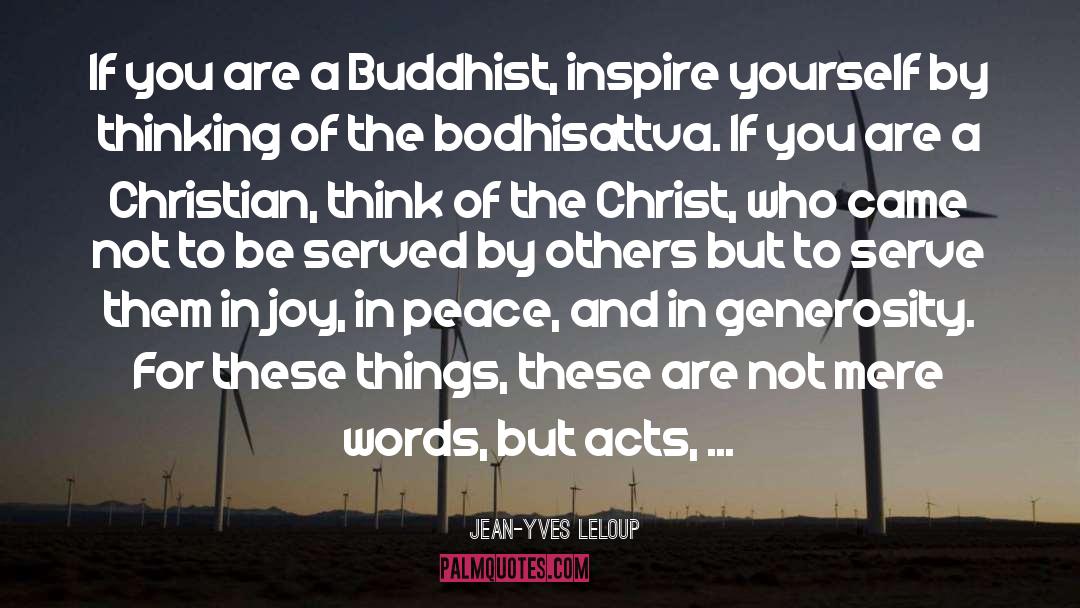
Perhaps I had inadvertently brushed up against the Buddhist axiom, that enlightenment is the ultimate disappointment. ~ Maggie Nelson
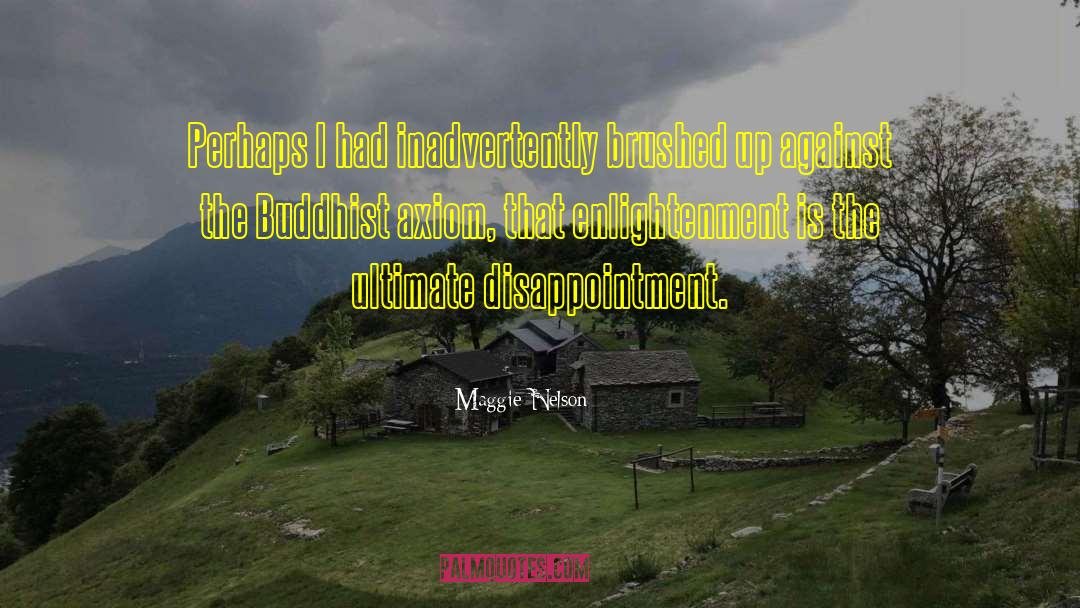
In 1993, I retired from the Art Ensemble of Chicago to devote myself full time to Buddhist studies and to the practice of Aikido. ~ Joseph Jarman

Give me a one-handed economist! All my economists say, On the one hand on the other. ~ Harry S. Truman
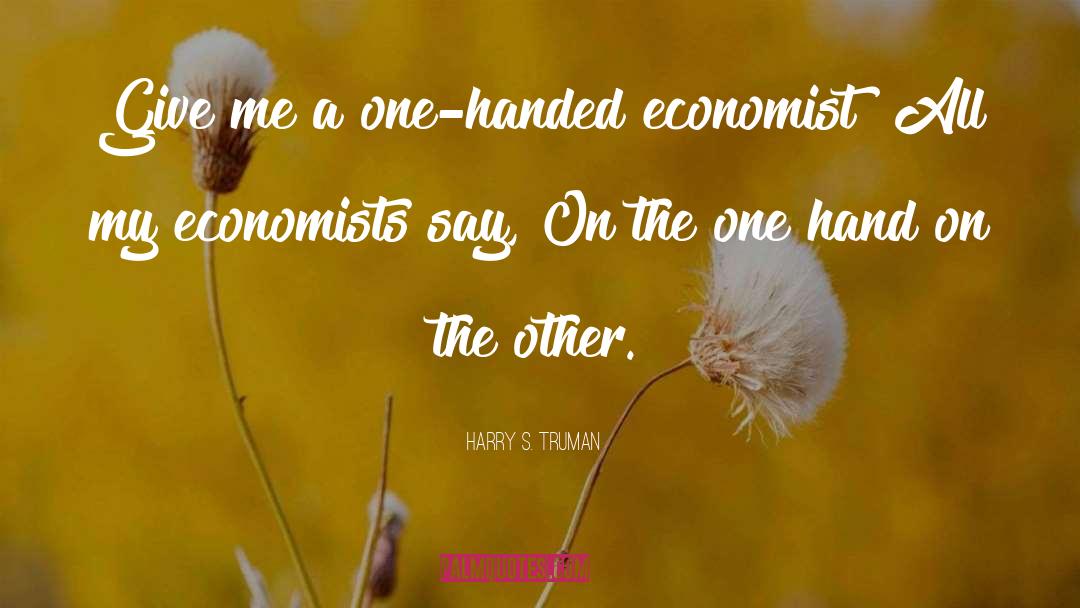
Let him the intelligent man admonish, let him teach, let him forbid what is improper ! - he will be beloved of the good, by the bad he will be hated. ~ Gautama Buddha
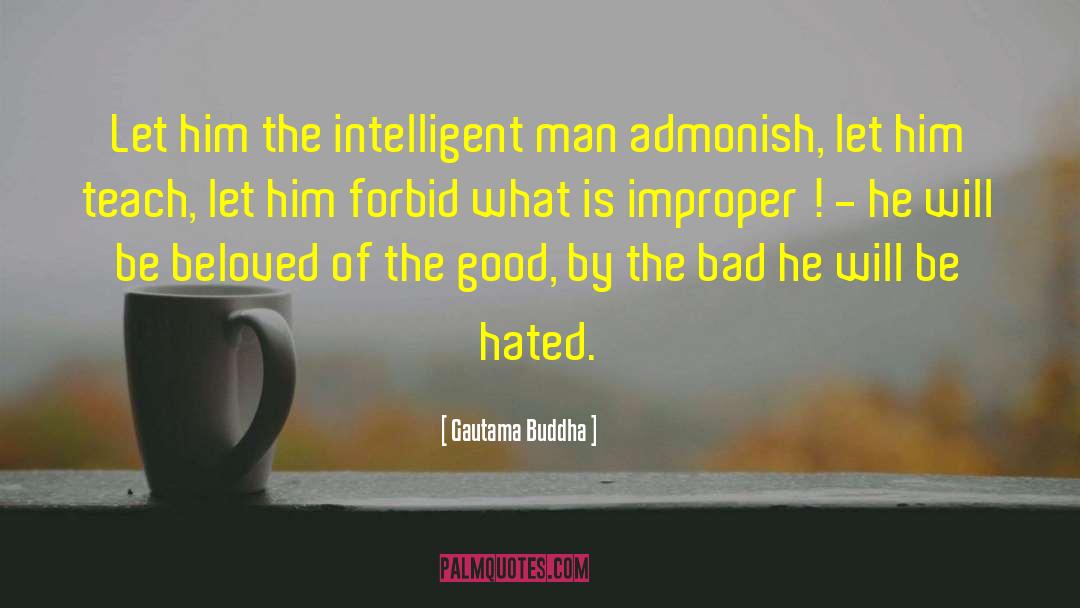
Take the common Buddhist practice of "noting," for example: practitioners learn to label their worries and feelings with a simple tag like "thinking" or "anger," taking note of them mindfully without engaging them directly. In a 2007 study, the UCLA psychologist Matthew Lieberman showed thirty volunteers fear-provoking images and then asked them to note their feelings ("I feel afraid") as he monitored their brain activity. Upon seeing the unpleasant images, the subjects' amygdalae lit up at first, but the labeling process soon sparked activity in the right ventrolateral prefrontal cortex, damping activity in the amygdala. Lieberman believes this mindful noting - the simple act of putting our feelings into words - helps the brain disambiguate our emotions and provide a level of detachment from them. "One of the ways labeling is useful is in talking with other people," he told me. "If you can get someone to talk about their feelings, it'll end up being beneficial to them in ways they may not realize." (Writing about how we feel in a journal serves the same purpose; it helps us sort out emotions, like anxiety, on a deeper subconscious level.) ~ Taylor Clark
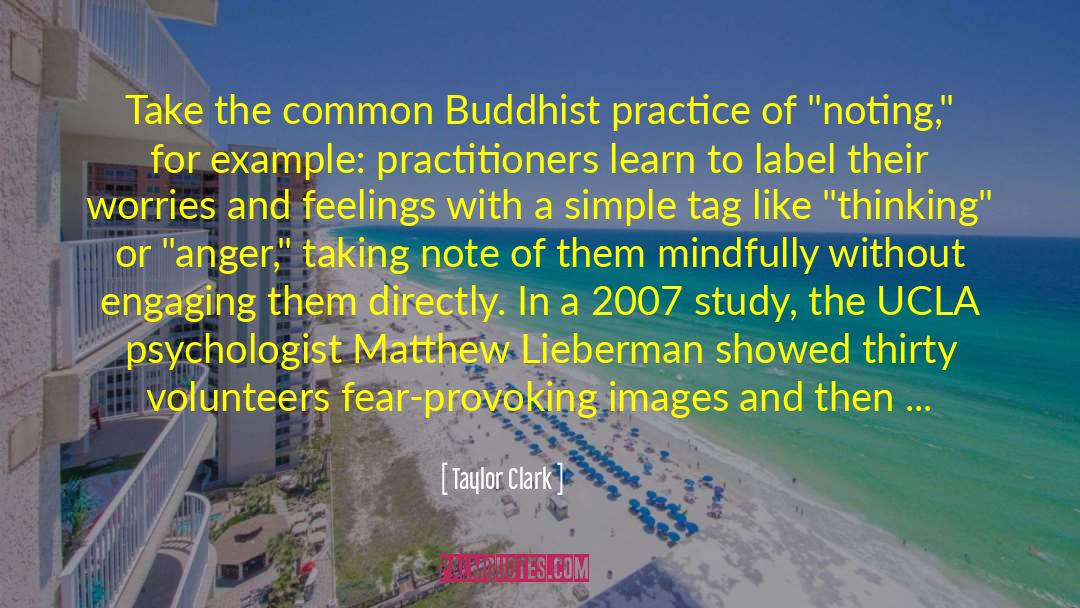
A good friend who points out mistakes and imperfections and rebukes evil is to be respected as if he reveals the secret of some hidden treasure. ~ Dalai Lama XIV
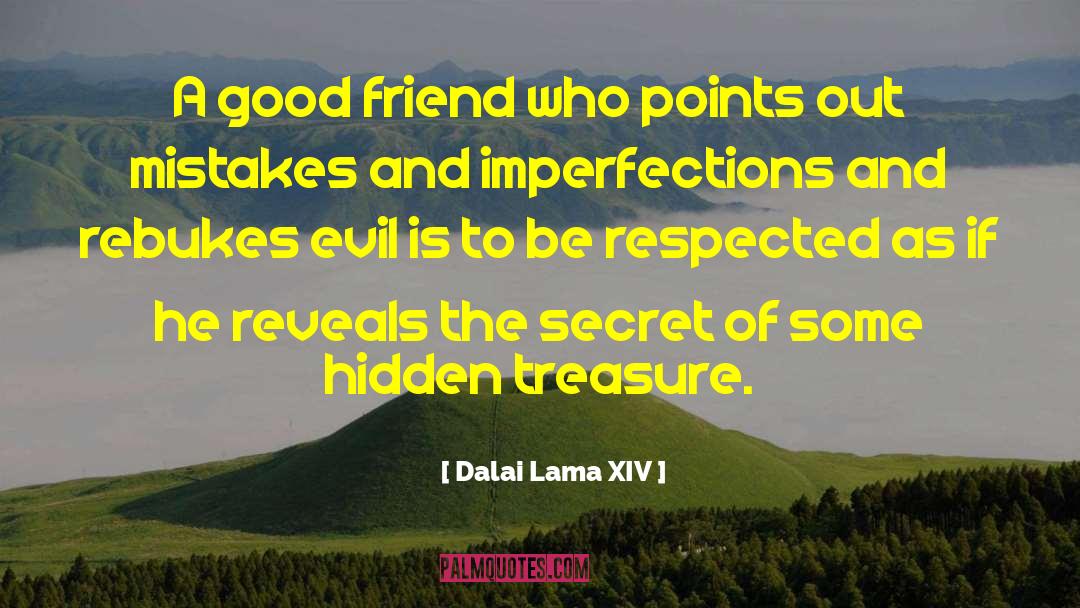
At university level, I had an economics lecturer who used to joke that I was the only student who handed in essays on British Airways notepaper. ~ Sebastian Coe

You've got a lifetime to mull over the Buddhist understanding of interconnectedness." He spoke every sentence as if he'd written it down, memorized it, and was now reciting it. "But while you were looking out the window, you missed the chance to explore the equally interesting Buddhist belief in being present for every facet of your daily life, of being truly present. Be present in this class. And then, when it's over, be present out there," he said, nodding toward the lake and beyond.'
~Dr. Hyde, pg 50 ~ John Green
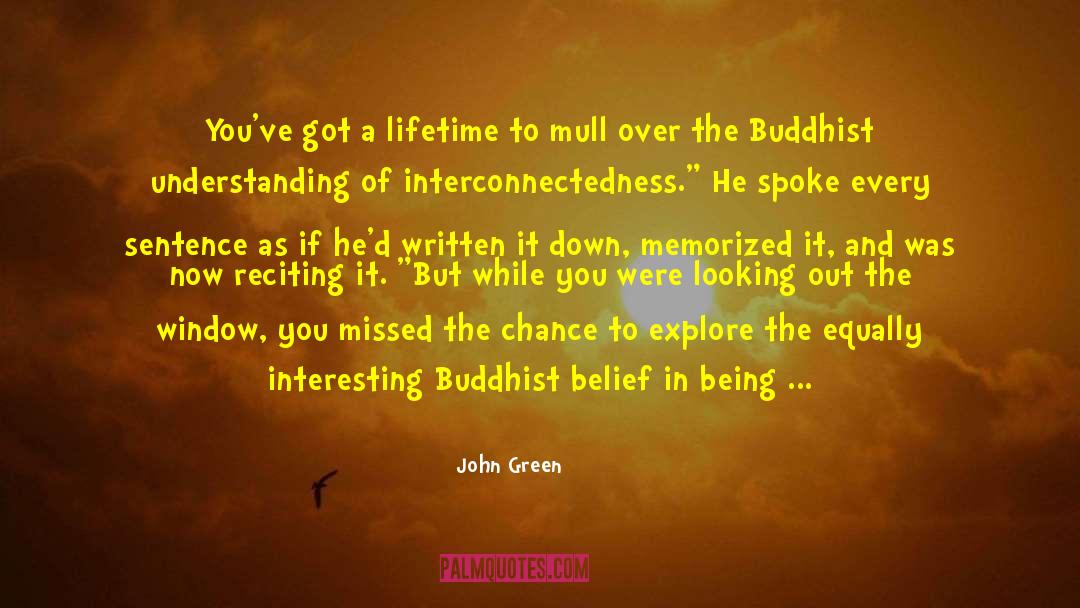
If you find no one to support you on the spiritual path, walk alone. There is no companionship with the immature. ~ Gautama Buddha

We spend most of our lives working. So why do so few people have a good time doing it? ~ Richard Branson
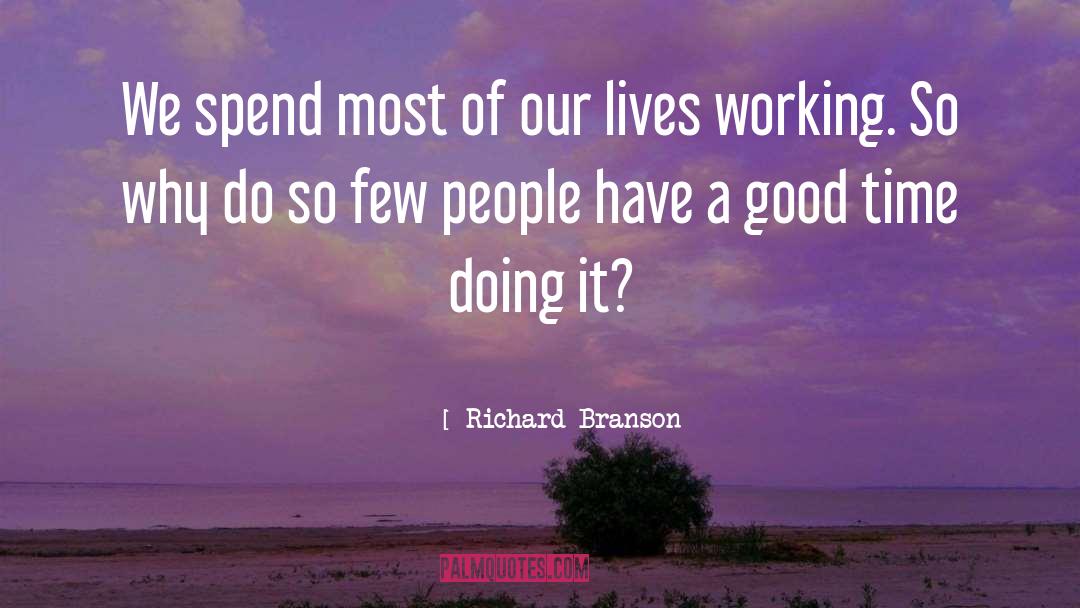
If the possessor of a units of money receives h additional units, then it is not at all true to say that he will value the total stock a + h exactly as highly as he had previously valued the stock a alone. Because he now has disposal over a larger stock, he will now value each unit less than he did before; but how much less will depend upon a whole series of individual circumstances, upon subjective valuations that will be different for each individual. ~ Ludwig Von Mises
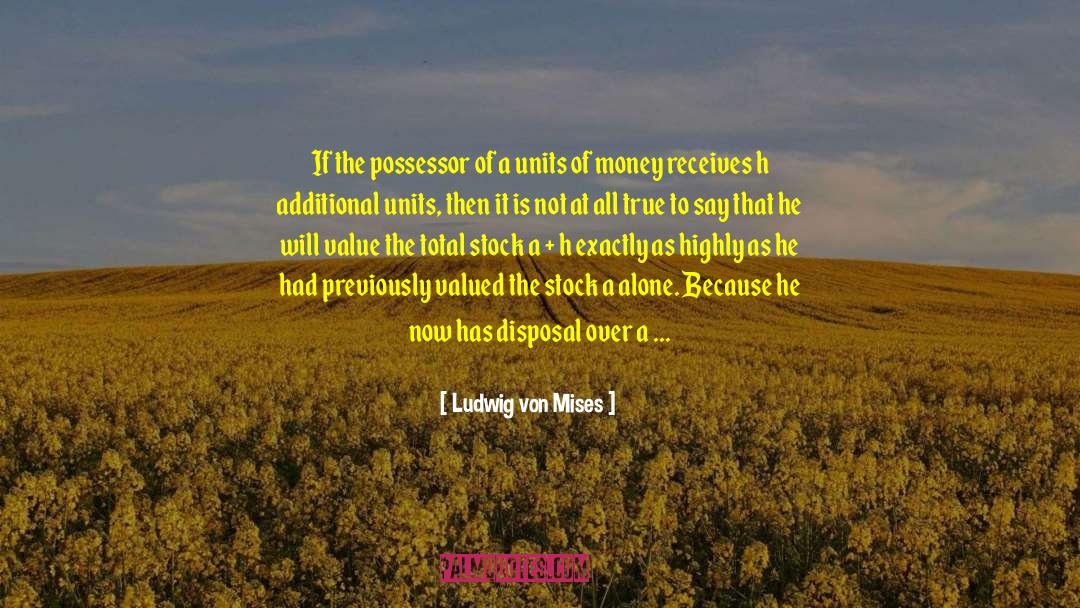
From a Buddhist perspective, it is incorrect to always assume that we know what is best. ~ Frederick Lenz
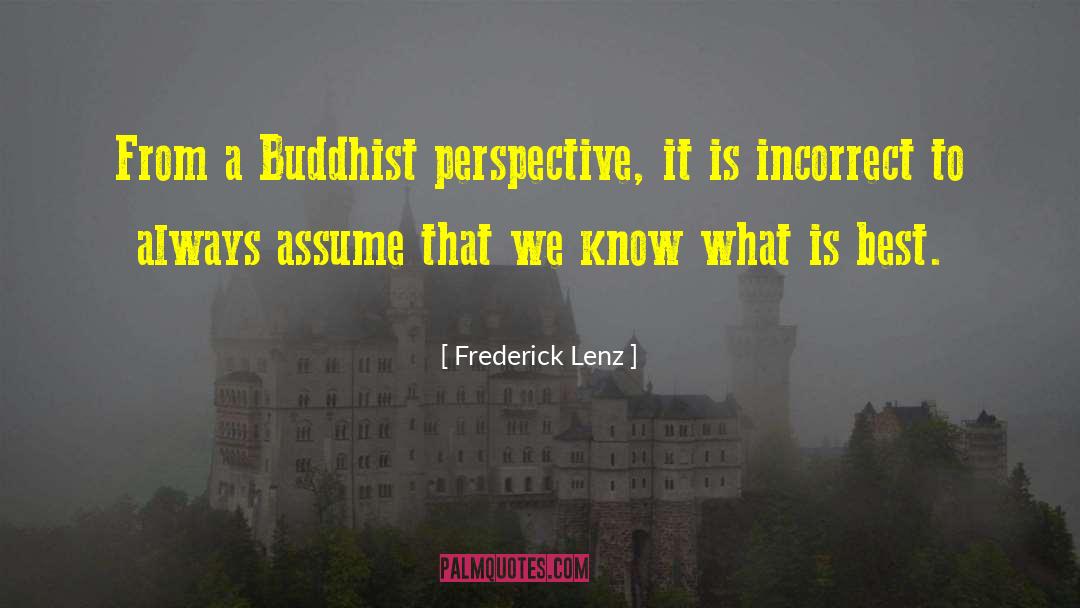
The objective exchange-value of money which rules in the market to-day is derived from yesterday's under the influence of the subjective valuations of the individuals frequenting the market, just as yesterday's in its turn was derived under the influence of subjective valuations from the objective exchange-value possessed by the money the day before yesterday. If in this way we continually go farther and farther back we must eventually arrive at a point where we no longer find any component in the objectIve exchange-value of money that arises from valuations based on the function of money as a common medium of exchange; where the value of money is nothing other than the value of an object that is useful in some other way than as money. ~ Ludwig Von Mises
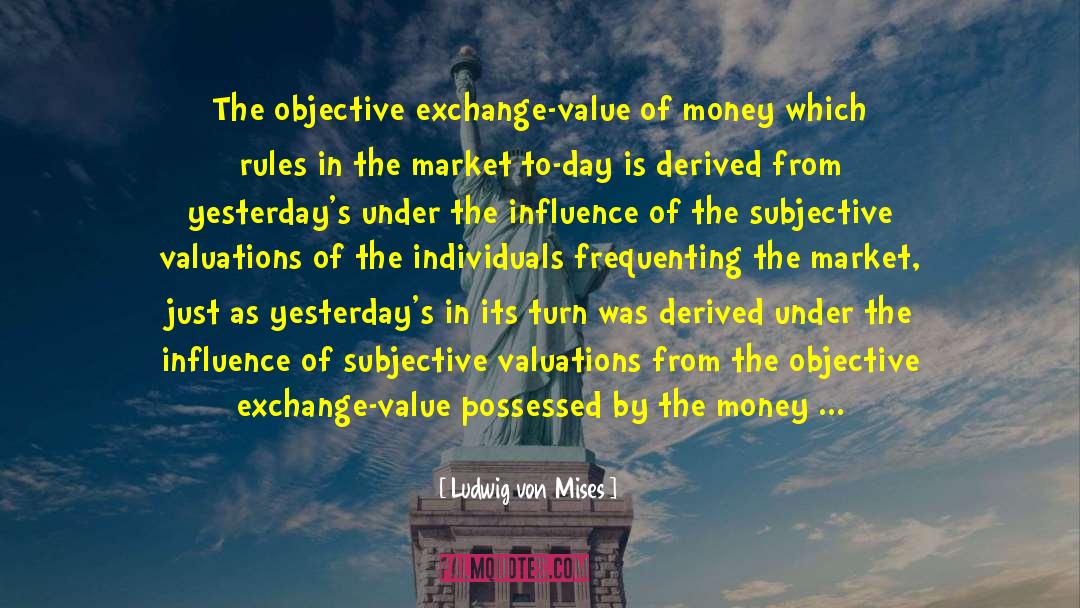
But there are nevertheless three conclusions that seem to follow from our critical examination of the possibilities of inflationary policy. In the first place, all the aims of inflationism can be secured by other sorts of intervention in economic affairs, and secured better, and without undesirable incidental effects. If it is desired to relieve debtors, moratoria may be declared or the obligation to repay loans may be removed altogether; if it is desired to encourage exportation, export premiums may be granted; if it is desired to render importation more difficult, simple prohibition may be resorted to, or import duties levied. All these measures permit discrimination between classes of people, branches of production, and districts, and this is impossible for an inflationary policy. Inflation benefits all debtors, including the rich, and injures all creditors, including the poor; adjustment of the burden of debts by special legislation allows of differentiation. Inflation encourages the exportation of all commodities and hinders all importation; premiums, duties, and prohibitions can be employed discriminatorily. ~ Ludwig Von Mises
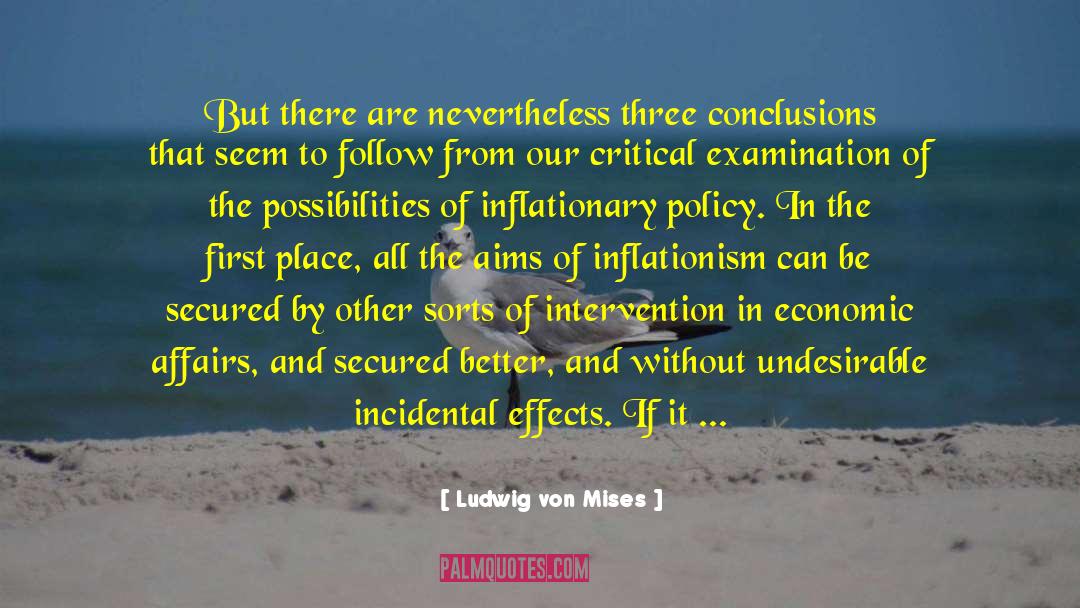
Love yourself and be awake- Today, tomorrow, always. First establish yourself in the way, Then teach others, And so defeat sorrow. To straighten the crooked You must first do a harder thing- Straighten yourself. You are your only master. Who else? Subdue yourself, And discover your master. ~ Gautama Buddha
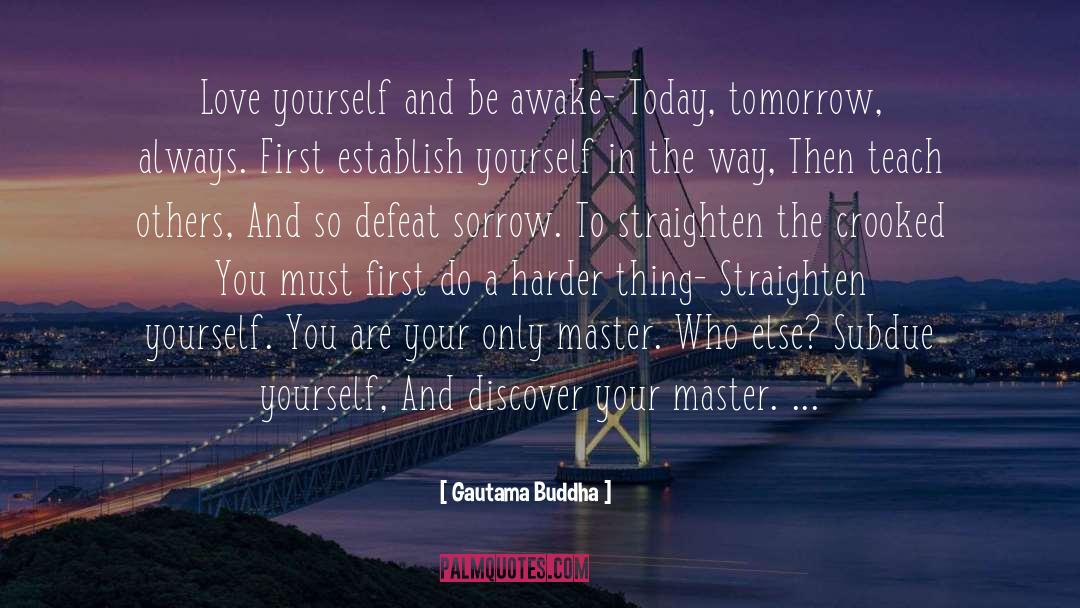
Marx, however imperfectly he worked out the details, set himself the task of discovering the law of motion of capitalism, and if there is any hope of progress in economics at all, it must be in using academic methods to solve the problems posed by Marx. ~ Joan Robinson
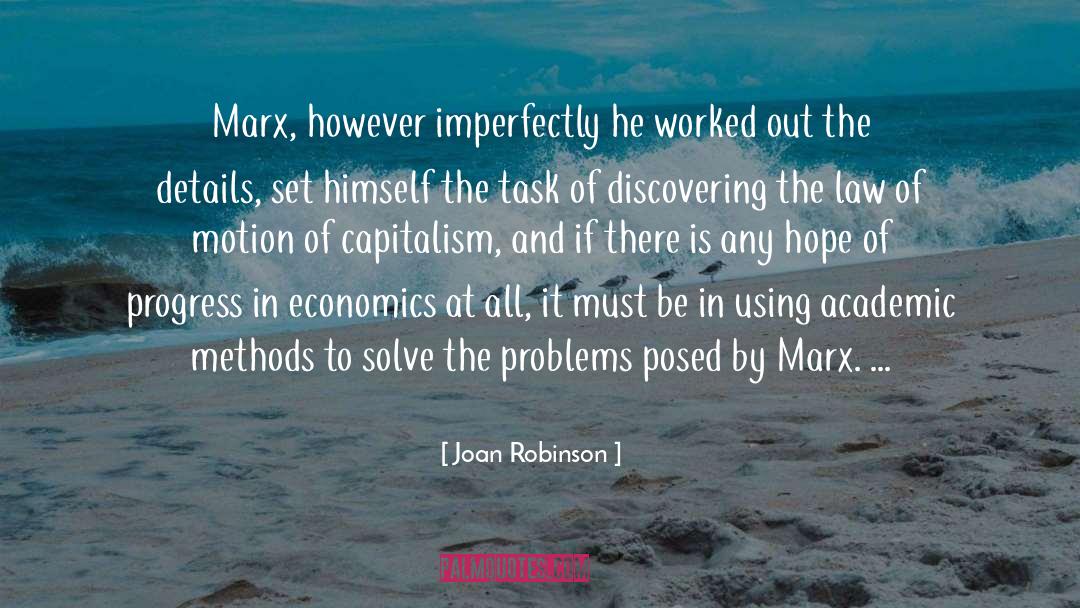
You create what you defend against. ~ Gautama Buddha

a lot of people have seen the futility of their lives, constantly ripped off by the banks, employed by the slaver corporations, lied to by politicians, manipulated by social media, spied on by everyone else... ~ Anonymous
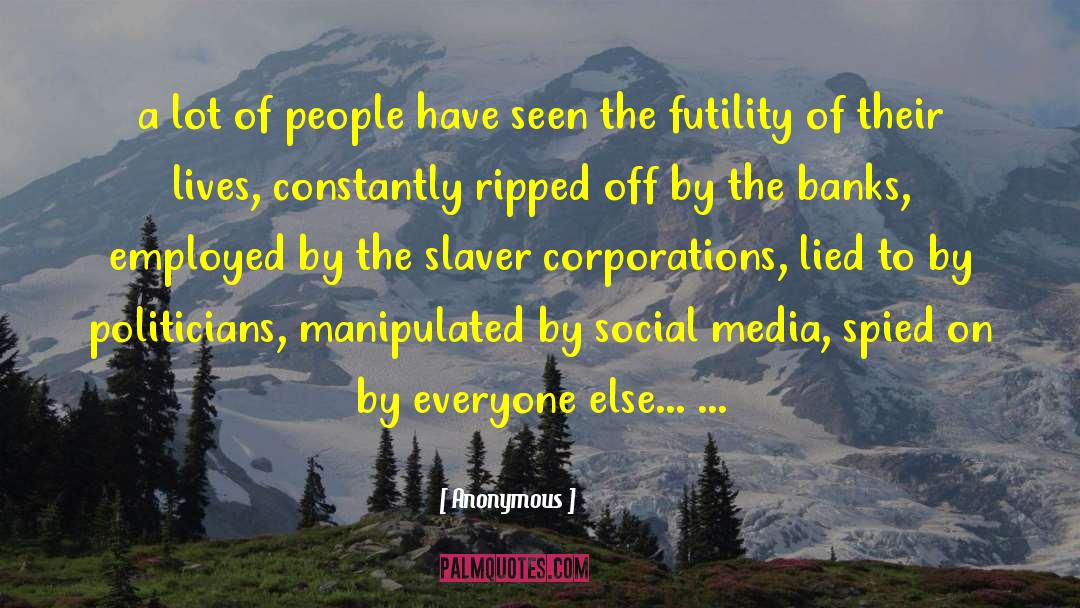
What I know is like the leaves on that tree; what I teach is only a small part. But I offer it to all with an open hand. What do I not teach? Whatever is fascinating to discuss, divides people against each other, but has no bearing on putting an end to sorrow. What do I teach? Only what is necessary to take you to the other shore. ~ Gautama Buddha
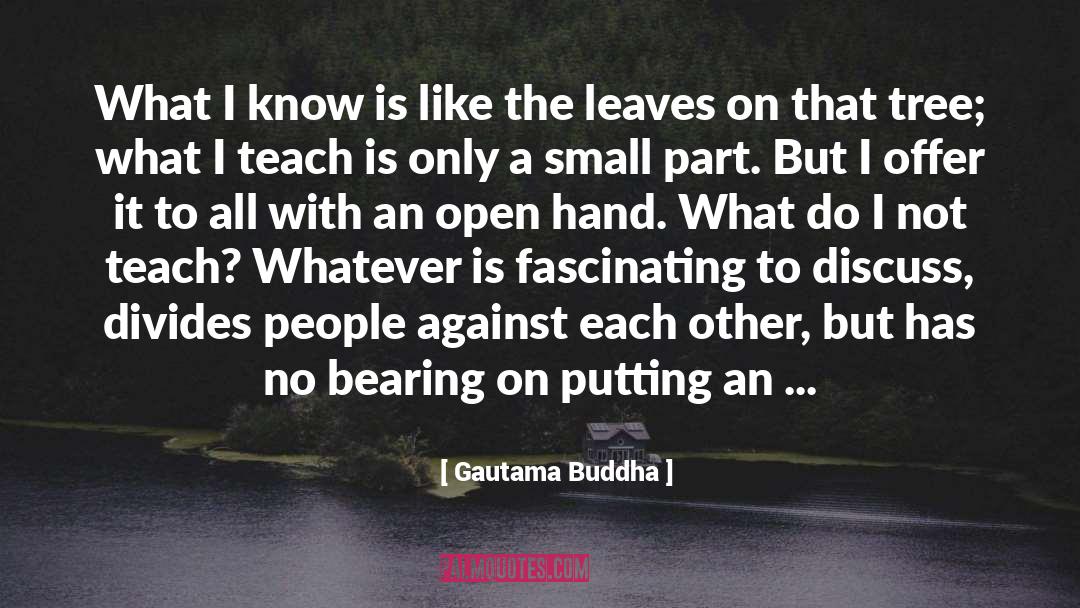
I have heard that all ideas of equality are visionary - that they can never be realized - and I believe it. But surely, though there must be hewers of wood, and drawers of water, they ought to have the absolute necessaries of life. ~ Charlotte Turner Smith
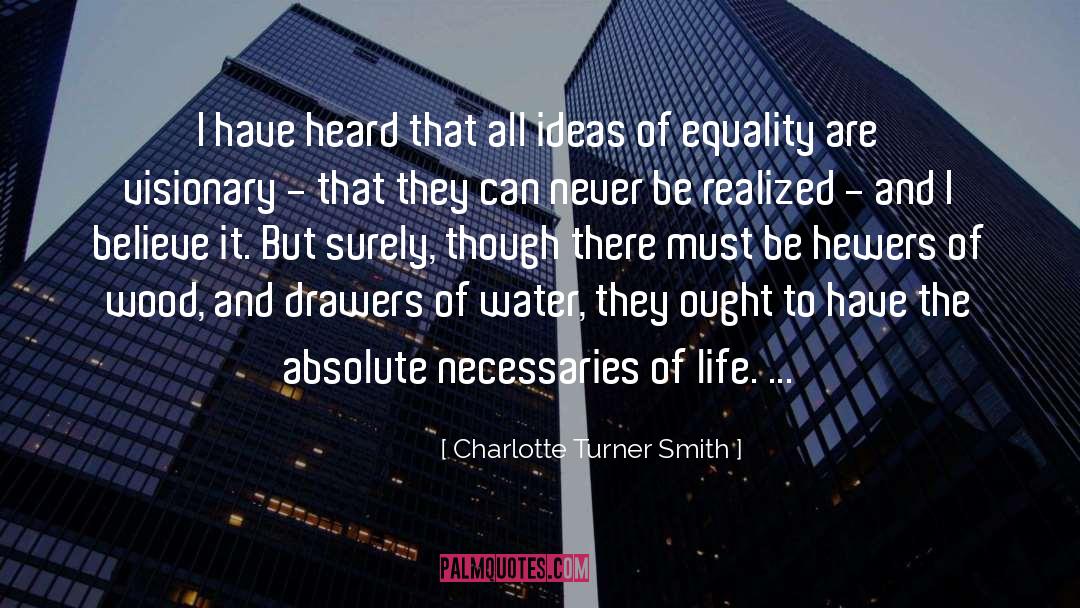
[Wise men] have tried to understand our state of being, by grasping at its stars, or its arts, or its economics. But, if there is an underlying oneness of all things, it does not matter where we begin, whether with stars, or laws of supply and demand, or frogs, or Napoleon Bonaparte. One measures a circle, beginning anywhere. ~ Charles Fort
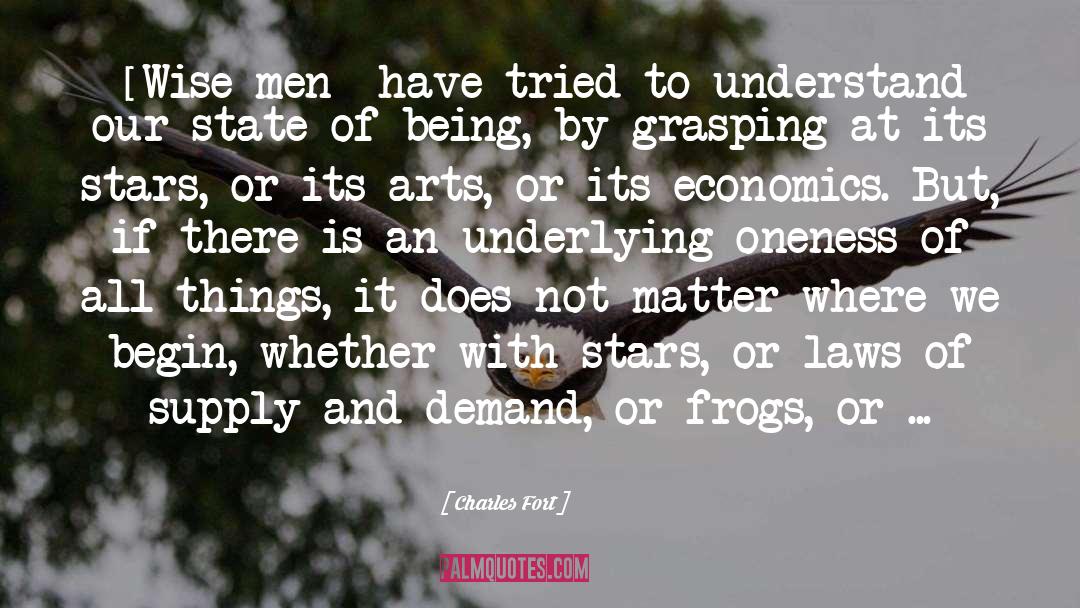
I went on a Buddha jag. I read 'Confession of a Buddhist Atheist' by Stephen Batchelor and Karen Armstrong's biography of Buddha, which is a great book. ~ Denis O'Hare

A lot of times, my work is looked at very much on the surface. It's very easy to just want to put something in a box - to say, 'Oh, since this work deals with surface desires at times, this is about consumerism.' And of course, the base of the work is ... not about economics at all. ~ Jeff Koons
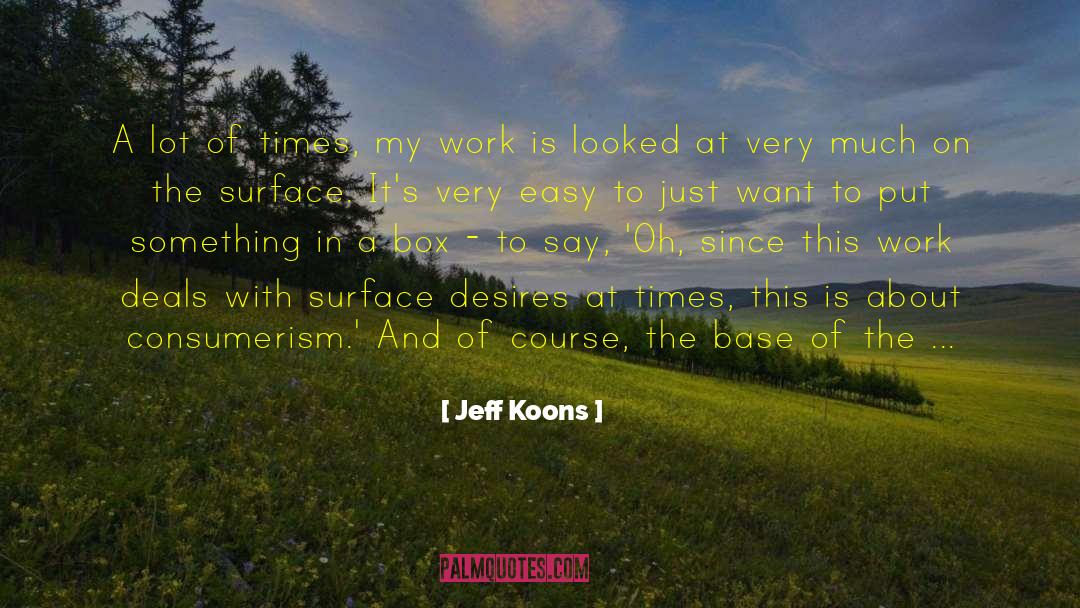
I want to be able to listen to recording of piano sonatas and know who's playing. I want to go to classical concerts and know when you're meant to clap. I want to be able to 'get' modern jazz without it all sounding like this terrible mistake, and I want to know who the Velvet Underground are exactly. I want to be fully engaged in the World of Ideas, I want to understand complex economics, and what people see in Bob Dylan. I want to possess radical but humane and well-informed political ideals, and I want to hold passionate but reasoned debates round wooden kitchen tables, saying things like 'define your terms!' and 'your premise is patently specious!' and then suddenly to discover that the sun's come up and we've been talking all night. I want to use words like 'eponymous' and 'solipsistic' and 'utilitarian' with confidence. I want to learn to appreciate fine wines, and exotic liquers, and fine single malts, and learn how to drink them without turning into a complete div, and to eat strange and exotic foods, plovers' eggs and lobster thermidor, things that sound barely edible, or that I can't pronounce...Most of all I want to read books; books thick as brick, leather-bound books with incredibly thin paper and those purple ribbons to mark where you left off; cheap, dusty, second-hand books of collected verse, incredibly expensive, imported books of incomprehensible essays from foregin universities.
At some point I'd like to have an original idea...And all of these ~ David Nicholls

In the long run we are all dead. Economists set themselves too easy, too useless a task if in tempestuous seasons they can only tell us that when the storm is long past the ocean is flat again. ~ John Maynard Keynes
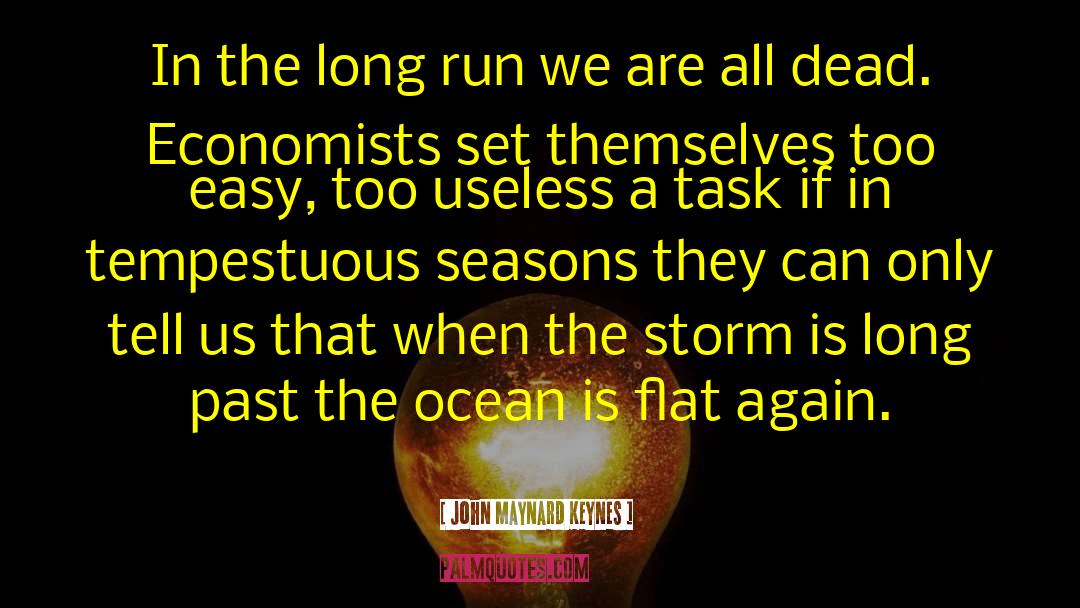
All tremble at violence; all fear death. Putting oneself in the place of another, one should not kill nor cause another to kill. ~ Gautama Buddha

In economics, the majority is always wrong. ~ John Kenneth Galbraith
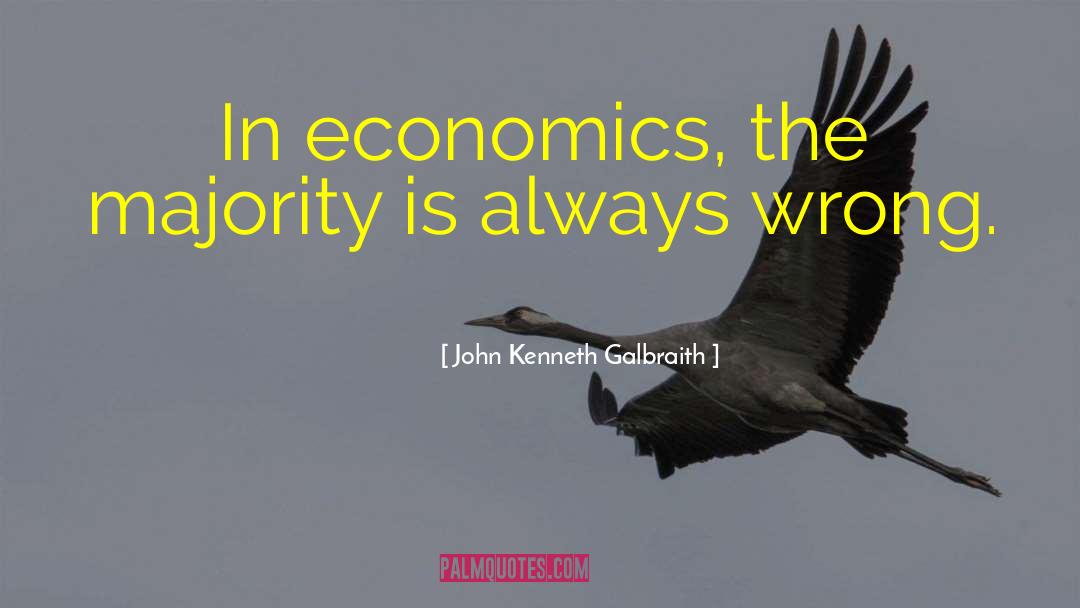
Alan Watts, the Buddhist scholar, proposed the existence of a mental faculty he called forgettory, which is the flip side of memory. There are times, Watts maintained, when we need to forget things, to let them slip away into the unremembered past. ~ Larry Dossey
